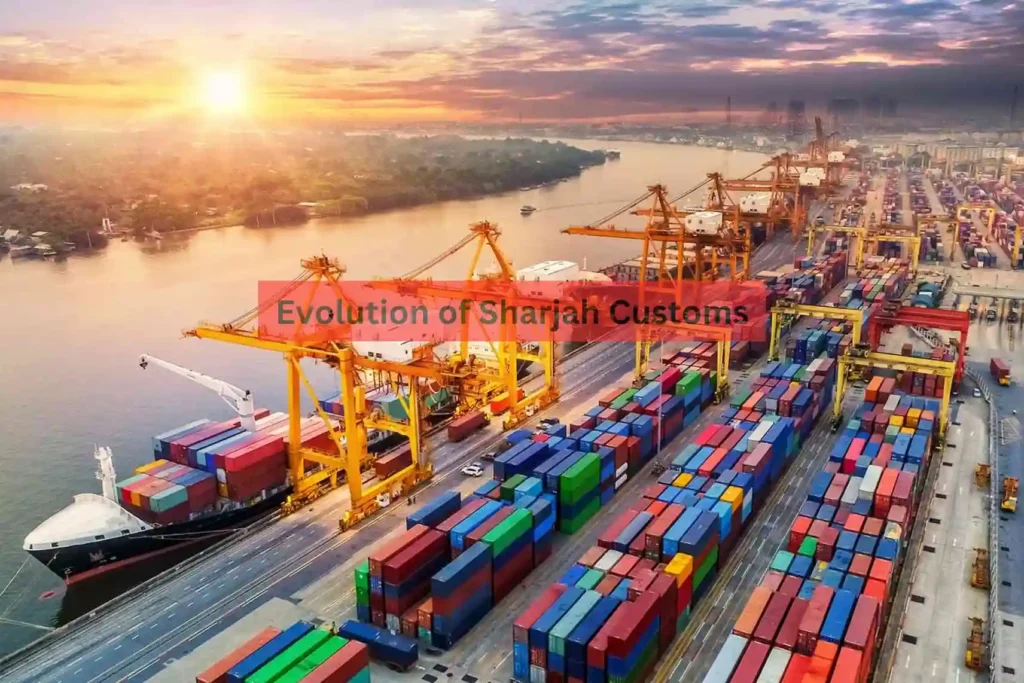The Sharjah Customs Authority has embraced technological innovation to streamline operations and enhance trade facilitation. The “e-Portal Sharjah Customs” is a cutting-edge digital platform that represents a monumental shift in how customs operations are conducted in Sharjah. This transformative platform offers convenience, transparency, and efficiency, making it an indispensable tool for businesses, traders, and individuals involved in import and export activities.
Evolution of Sharjah Customs
Customs departments worldwide play a pivotal role in regulating trade, ensuring compliance with regulations, and generating revenue for the state. Sharjah Customs, as a gateway to the UAE’s robust trade ecosystem, has continuously evolved to meet modern demands. Historically reliant on manual processes, the introduction of the e-Portal signifies a leap into the digital age, allowing stakeholders to navigate customs procedures with unprecedented ease.

Key Features of the E-Portal Sharjah Customs
The e-Portal Sharjah Customs is designed with user-centricity at its core. It encompasses features that cater to a diverse array of users, from individual importers to multinational corporations. Below are the standout features of the platform:
- Online Services Integration: The portal seamlessly integrates multiple services, such as customs declarations, cargo tracking, payment of duties, and compliance certifications.
- Enhanced Transparency: Users can access detailed records of their transactions, ensuring accountability and reducing the possibility of disputes.
- Secure Transactions: With robust encryption and multi-factor authentication, the platform prioritizes the security of users’ data and financial transactions.
- Real-Time Updates: Traders can receive real-time notifications about cargo clearance status, document submissions, and regulatory changes.
- Multilingual Support: The portal accommodates users from various linguistic backgrounds, promoting inclusivity.
Simplified Customs Processes
Traditional customs procedures were often time-consuming and complex, involving multiple visits to customs offices and extensive paperwork. The e-Portal Sharjah Customs simplifies these processes by digitizing document submission and approval workflows. Users can upload required documentation, such as invoices, bills of lading, and certificates of origin, directly through the portal.
Moreover, the system employs automation to verify document accuracy, flag discrepancies, and expedite approvals. This automation significantly reduces processing times, enabling faster cargo clearance and minimizing delays in supply chains.
| Feature | Traditional Customs | E-Portal Sharjah Customs |
|---|---|---|
| Document Submission | Manual | Online |
| Processing Time | Lengthy | Rapid |
| Transparency | Limited | High |
| User Accessibility | Restricted | Wide and Multilingual |
| Security | Moderate | Advanced Encryption |
Supporting Economic Growth
The UAE is renowned as a global trade hub, and Sharjah plays a critical role in supporting the nation’s economic ambitions. The e-Portal not only simplifies trade procedures but also fosters economic growth. By reducing the time and costs associated with customs clearance, the platform enhances Sharjah’s competitiveness as a trade destination.
Local businesses benefit immensely, particularly small and medium enterprises (SMEs), which often lack the resources to navigate complex customs processes. The portal levels the playing field, enabling SMEs to participate more effectively in international trade.
Compliance and Risk Management
Another essential aspect of the e-Portal Sharjah Customs is its focus on regulatory compliance and risk management. The system is equipped with advanced algorithms to identify and mitigate risks associated with illegal trade, smuggling, and non-compliance with customs regulations.
Users are guided through compliance requirements via the platform, which provides clear instructions and ensures that all necessary documentation is in place. This feature not only protects national security but also reduces the likelihood of penalties for users, fostering a culture of compliance.
Environmental Impact
The shift to digital customs operations also has a positive impact on the environment. By eliminating paper-based processes, the e-Portal contributes to the reduction of paper waste and promotes sustainable practices. Additionally, fewer physical visits to customs offices mean reduced carbon emissions, aligning with the UAE’s commitment to environmental sustainability.
Accessibility and User Experience
The e-Portal is designed to be highly accessible, with a user-friendly interface that simplifies navigation. Stakeholders can access the platform from desktop computers, tablets, or smartphones, ensuring flexibility. The availability of customer support ensures that users receive prompt assistance with any issues or queries, further enhancing the user experience.
Future Prospects and Innovations
The e-Portal Sharjah Customs continues to evolve, with plans for further enhancements. These may include integration with blockchain technology for heightened security, predictive analytics to forecast trade trends, and artificial intelligence to provide smarter, personalized user experiences.
As global trade becomes increasingly complex, the platform’s ability to adapt and incorporate cutting-edge technologies will be crucial in maintaining Sharjah’s status as a leader in trade facilitation.
Sitelinks
For more information about the e-Portal Sharjah Customs, visit the following links:
Related Searches
- Sharjah Customs Clearance Process
- UAE Customs Regulations 2025
- Import and Export in Sharjah
- Digital Customs in the UAE
- How to Use e-Portal Sharjah Customs
The e-Portal Sharjah Customs marks a new era in customs operations, aligning with Sharjah’s vision of becoming a digitally empowered economy. By streamlining processes, ensuring compliance, and fostering transparency, the platform benefits traders, businesses, and the government alike. As it continues to innovate and adapt, the e-Portal is poised to set new benchmarks in trade facilitation and digital transformation.
